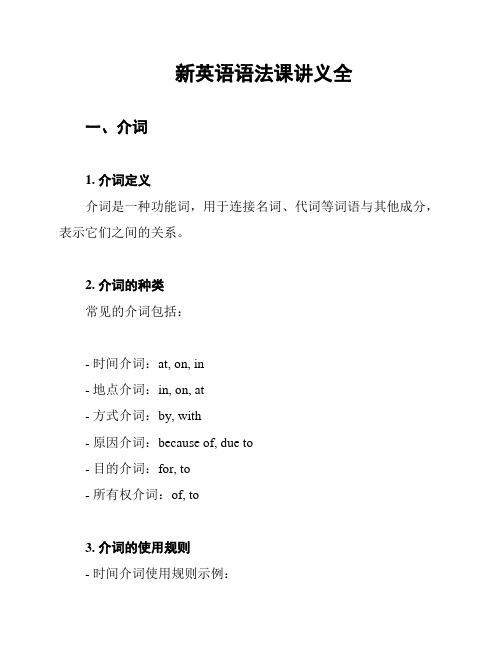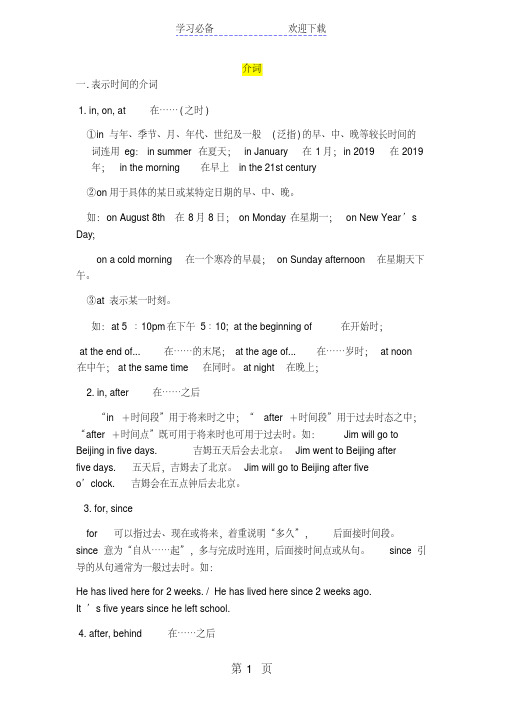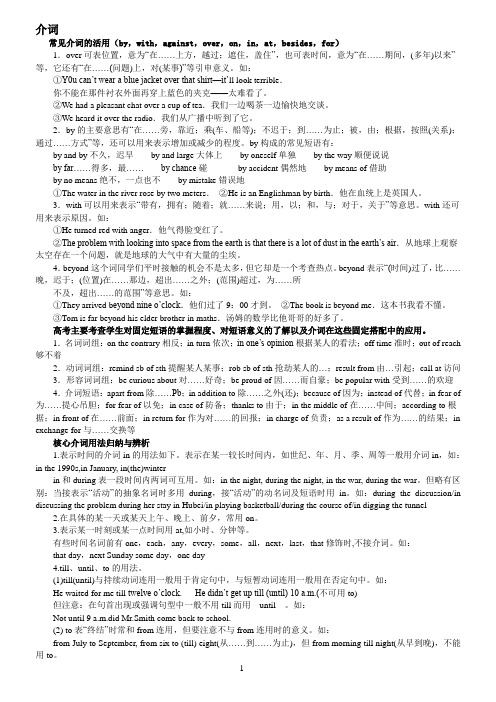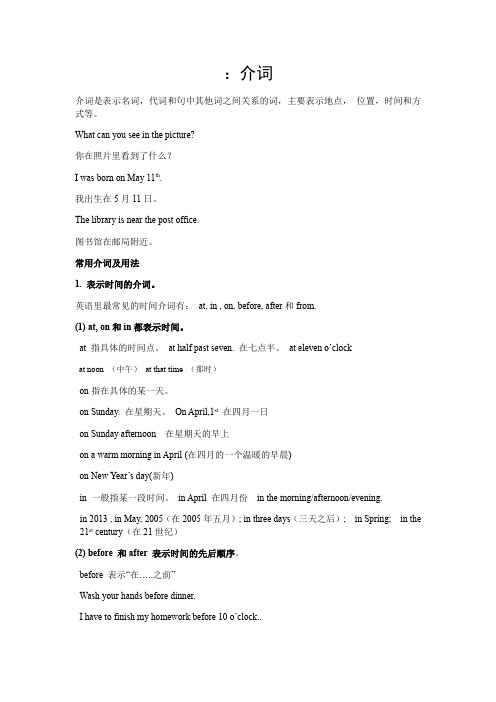最新介词讲义完整版
介词(讲义)通用版英语六年级下册

介词一、介词的定义:介词一般位于名词或代词之前,在句中不单独做任何成分。
介词本身有独立的含义,但意义不够完整,在句中使用时,后面必须接有宾语构成介词短语后,才能表达完整的意义。
介词短语在句中常作状语、定语、表语或宾语补足语。
二、介词的用法:(一)表示时间的介词的用法:1. at, on, in(1)at 在句中用在钟点之前,意为“在……点钟”。
如:at six. 在6点。
(2)at用在固定短语中。
如:at noon在中午;at this time of year 一年这个时候(3)on常用于表示具体的哪一天或某天的上午、下午及晚上或用于固定短语中。
如:on the morning of June 在6月5日的早上;on a cold winter night 在一个寒冷的冬天的夜里;on May 20th 在5月20日(4)on用在星期前。
如:on Sunday在星期日(5)in用于年、月前面,季节、世纪前以及固定短语中。
如:in 2008 在2008年;in October在10月;in spring 在春天;in the twentieth century 在二十世纪;in his twenties 在他二十多岁时;in the morning / afternoon / evening在早上/下午/晚上2. before , after, in(1)in是以现在为起点,表示将来一段时间以后,常用于一般将来时态中。
如:I will come back in three days. 我三天以后回来。
如:She went after three days. 她三天以后走的。
(3)before 表示“某时刻或某时间之前”时态根据句子而定。
如:Check your papers carefully before you hand them in.【典例精析】Mrs. Brown came to China ____ 1996.A. onB. ofC. to,D. in【答案】D【解析】in用于年、月前面,季节、世纪前以及固定短语中随堂小练习1( ) 1. He often goes ______ school ______ six thirty ______ the morning.A. for; to; inB. to; at; inC. to; for; at D, for; at; to( ) 2. ______ a cold winter morning, I met her in the street.A. inB. onC. atD. for( )3. Joan hopes to come back ______ three days.A. afterB. forC. in(二)表示地点方位介词的用法:1. at, inat 后跟小地方;in后跟大地点2. in, on, toin表示在某一范围内的某方位;on表示与某地相邻关系;to表示在某一地区之外的某方位,不属于该范围。
介词讲义完整版

,介词的分类1. 简单介词,是指单个的介词女口:in, on, at, on, to, with 等2. 合成介词,是指两个简单介词合在一起构成的介词如:in to, on to, without, i nside3. 短语介词,是指一个或两个简单介词与一个或几个其他词类的词组合,在意义和作用上相当于一个简单介词的短语如:in stead of 代替because of 因为accord ing to 按照二,表示时间的介词in front of在…的前面1. at表示具体的时间点女口:at eight o'clock联想:at构成的固定短语:at first 首先at least 至少at prese nt 目前at noon在中午at the age of在…岁时at the same time同时at the end of在。
末at the mome nt在目前,现在at school在上学女口: _________________________________________________ In some wester n coun tries shops are closed _____________________________ w eeke nds.2. in用于年,月,季节,上午,下午,晚上等。
in March在三月in spri ng在春天in 2008 在2008 年in the morni ng/afterno on /eve ning注意:in表示在某一季节或某一月份时,一般不加冠词,但季节和月份的意义一旦具体化,就要加定冠词the。
女口:The weather is a little in May.An earthquake happe ned in Sichua n in the May of 2008.In summer childre n are happy because they can swim.联想:in构成的固定短语:show great interest in 对。
2023届高考英语语法知识:常用介词考点分析讲义

2023年高中英语语法知识精讲:常用介词考点分析一、shoot to, shoot at 及其他有网友问:在语法书和教辅书上,读到有关shoot to和shoot at 的区别,都说shoot to用于距离远、体积大的物体;shoot at用于距离近、体积小的物体。
请问,是这样的吗?这种说法很牵强,属于只看到现象,未触及本质。
用shoot to 还是shoot at与物体的远、近、大、小,没有直接的关系。
以下是我的理解和看法:shoot作“射击”讲,既是及物动词,也是不及物动词。
及物时表示“射中”,如:shoot the tiger(射中老虎);不及物时,跟不同介词搭配有不同的含义,例如:shoot at the wolf 朝着狼射击shoot to the woods 朝着森林方向射击shoot into the house 朝房内射击通过比较,我们发现:shoot本身没有变化,差别就在于,不同的介词有不同的含义。
at 表示“目标”;to表示“方向”;into表示“朝…….里面(有容积的物体)”。
所以,它们的区别与射击目标的“远、近、大、小”没有直接关系。
比方说,“朝着东方射击”,就用shoot to,因为to 表示“方向”,这时不能用at;wolf是目标就用at,但woods用at 就不合适。
类似的用法,也适应于look,point等词,请读者仔细体味:look at the blackboard (看黑板)look to the west(向西看)look into the water(向水里望去)point at the picture (指着图片)point to the wall (朝墙的方向指去)point into the sky(向空中指去)during the night与in the night的区别有朋友在本站“答疑中心”询问 during the night 与 in the night 的用法区别。
新英语语法课讲义全

新英语语法课讲义全一、介词1. 介词定义介词是一种功能词,用于连接名词、代词等词语与其他成分,表示它们之间的关系。
2. 介词的种类常见的介词包括:- 时间介词:at, on, in- 地点介词:in, on, at- 方式介词:by, with- 原因介词:because of, due to- 目的介词:for, to- 所有权介词:of, to3. 介词的使用规则- 时间介词使用规则示例:- I will meet you at the bus stop.- She has an appointment on Friday.- The party is in the evening.- 地点介词使用规则示例:- The book is on the table.- She lives in New York City.- The cat is sitting at the window.- 方式介词使用规则示例:- He goes to work by car.- They painted the house with a brush. - She sang a song with passion.- 原因介词使用规则示例:- The delay was due to technical issues.- 目的介词使用规则示例:- He bought flowers for his girlfriend. - She went to the store to buy groceries.- 所有权介词使用规则示例:- The color of the sky is blue.- I will give the book to you.二、名词1. 名词定义名词是一种词性,用来表示人、事物、地方、概念等。
2. 名词的分类常见的名词分类有:- 可数名词- 不可数名词- 特殊名词- 抽象名词3. 名词的用法- 可数名词使用规则示例:- I have two books.- They bought three cars.- She has many friends.- 不可数名词使用规则示例:- I need some advice.- He has a lot of money.- Do you have any information?- 特殊名词使用规则示例:- The Alps is a beautiful mountain range.- The United States is a large country.- 抽象名词使用规则示例:- Love is a powerful emotion.- Honesty is important in a relationship.以上是新英语语法课的讲义内容,希望能对你的研究有所帮助!。
介词讲义

介词一、介词的分类:时间介词地点介词方式介词二、知识点精讲:1.表示地点位置的介词1)at ,in, on, to:in表“范围较大的地方”,强调“空间”;at表在“范围较小的地方”,强调“点”;on 表“在物体的表面”in:(1)表示在大地方; He arrives ____ Nanjing . (2)表示“在…范围之内” He lives____ the bedroomat: (1)表示在小地方; He arrives ____ home (2)表示“在……附近,旁边” He sat ____the table表示方位:in:表“在…范围之内” on: 表毗邻,接壤,。
t o: 表示在……范围外,不强调是否接壤;或“到……”Hunan lies ___the south of Hubei. Taiwan lies ___the east of China. China lies _____the west of America.表位置:in “在……内”,on “在……上”(接触表面),on “在两边”“在左/右边”。
They are putting up a picture_________thewall.The girl ______the right is a famous actress.1)____ the tree 用于指树上的鸟、人等。
___ the tree用于指生长在树上果实。
2)____ the wall镶嵌在墙内,窗户、门等。
____ the wall在墙的表面之上,地图等。
在报纸上____ the newspaper报上的内容。
____ the newspaper放在报纸上的东西3).There is a big hole ____ the wall. 4).The teacher put up a picture ____ the wall.2)by, beside, near和next to/close to1) by和beside均表示“在……旁边”,常可换用There is a chair ____ the table. 桌子边上有一把椅子。
2025英语大一轮复习讲义人教版语法专题介词

in length在长度上 in exchange for作为交换 in favor of支持,赞成 in no time立刻 in case of万一;如果;假使 in no way决不 in support of为支持…… in place of代替
in honour of为向……表示敬意 in possession of拥有,占有 in memory of为了纪念…… in addition to另外
规则感悟
①on指在具体的某一天。②in用在年/月/季节/世纪等大时间之前, 或者指上/下午或晚上;也可用在表示一段时间的词之前,表示 “ 多 久 之 后 ” 。 ③at 用 在 几 点 钟 或 night/noon 之 前 。 ④before 在……之前。⑤until直到……时候。⑥during在……期间。⑦for 表示延续一段时间。⑧over表示“在……期间”,表延续。
(3)be+adj.+in be absorbed in专注于…… be active in积极于…… be dressed in穿着…… be engaged in忙于…… be rich in富含…… be occupied in忙于……
2.表示时间的介词 It happened on① a Saturday morning in② November,2021.My parents left
home at③ 6:00 am to meet my uncle at the airport and told me they would come back in② two hours.However,it wasn’t long before④ someone knocked at the door,and I looked through the peephole and saw a stranger.I quickly locked the door from the inside,and didn’t open it until⑤ my parents came back.During⑥ the two hours,the stranger always tried to tell me something but I wouldn’t listen to him.On seeing my parents,the stranger said,“I have been waiting out of the door for⑦ two hours since 6:10 am.” Why had my uncle changed so much over⑧ the years?
介词中考专题讲义

介词一.表示时间的介词1. in, on, at在……(之时)①in与年、季节、月、年代、世纪及一般(泛指)的早、中、晚等较长时间的词连用eg: in summer在夏天; in January在1月;in 2019 在2019年; in the morning在早上 in the 21st century②on用于具体的某日或某特定日期的早、中、晚。
如:on August 8th在8月8日; on Monday在星期一;on New Year’s Day;on a cold morning在一个寒冷的早晨;on Sunday afternoon在星期天下午。
③at表示某一时刻。
如:at 5∶10pm 在下午5∶10; at the beginning of在开始时;at the end of...在……的末尾;at the age of...在……岁时; at noon在中午;at the same time在同时。
at night在晚上;2. in, after 在……之后“in +时间段”用于将来时之中;“after+时间段”用于过去时态之中;“after+时间点”既可用于将来时也可用于过去时。
如: Jim will go to Beijing in five days. 吉姆五天后会去北京。
Jim went to Beijing afterfive days. 五天后,吉姆去了北京。
Jim will go to Beijing after fiveo’clock. 吉姆会在五点钟后去北京。
3. for, sincefor可以指过去、现在或将来,着重说明“多久”,后面接时间段。
since意为“自从……起”,多与完成时连用,后面接时间点或从句。
since引导的从句通常为一般过去时。
如:He has lived here for 2 weeks. / He has lived here since 2 weeks ago.It’s five years since he left school.4. after, behind 在……之后after主要用于表示时间;behind主要用于表示位置。
最新常用德语连词、介词上课讲义

常用德语连词一、并列:1.连和;und, und auch, und zwar, aoch, bloss, d.h., bzw., z,B., namentlich, als, nicht nur…sondern auch, sowohl...als auch, ausserdem, bald...bald, einerseits...an dererseits, teils...teils.2.选择;entweder…oder3.对立;aber, allein, jedoch, doch, nicht…sonde rn, dagegen, allerdings, dennoch4.条件;sonst5.理由;denn, nämlich6.时间;dann, indessen, manchmal,7.结果;also, daher, so, deshalb, deswegen, folglich,8.目的;darum, dazu9.让步;zwar…aber, trotzdem,10.比较;ebenso11.限制;nur,12.否定;weder…noch, nicht…noch,二、从属:1.对立;während2.条件;wenn, falls, nur wenn, vorausgesetzt,d ass; unter Bedingung,dass;3.理由;weil, da4.时间;als, wenn, nachdem, während, sooft, bis, bevor, ehe, seit, sobald, solange, sowie, kaum dass5.结果;so dass,zu…,als dass6.目的;damit, um…zu, auf dass, damit dass7.让步;obgleich,obwohl, obzwar, wenn auch8.情况;indem9.比较;wie, als, als ob, als wenn, wie wenn10.比例;je…desto, je…umso, je nachdem11.限制;nur dass, ausgenommen dass, ausser dass, soviel, soweit12.手段;dadurch dass, indem13.否定;ohne dass, ohne …zu, (an)statt dass, (an)statt… zu14.引入;dass, ob德语常用介词1.mit Akkusativ: bis; für; durch; gegen; ohne; um; entlang; wider2.mit Dativ: aus; ausser; bei; gegenüber; mit; nach; von; zu; seit; ab; dank; entgegen;3.mit Genitiv: (an)statt; trotz; während; wegen; ausserhalb; innerhalb; kraft; infolge; um…willen;mittels/vermittel s; ungeachtet; zwecks4.mit Dativ oder Akkusativ: an; auf; hinter; in; neben; über; unter; vor; zwischen。
介词讲义

介词常见介词的活用(by,with,against,over,on,in,at,besides,for)1.over可表位置,意为“在……上方,越过;遮住,盖住”,也可表时间,意为“在……期间,(多年)以来”等,它还有“在……(问题)上,对(某事)”等引申意义。
如:①Y0u can’t wear a blue jacket over that shirt—it’ll look terrible.你不能在那件衬衣外面再穿上蓝色的夹克——太难看了。
②We had a pleasant chat over a cup of tea.我们一边喝茶一边愉快地交谈。
③We heard it over the radio.我们从广播中听到了它。
2.by的主要意思有“在……旁,靠近;乘(车、船等);不迟于;到……为止;被,由;根据,按照(关系);通过……方式”等,还可以用来表示增加或减少的程度。
by构成的常见短语有:by and by不久,迟早by and large大体上by oneself单独by the way顺便说说by far……得多,最…… by chance碰by accident偶然地by means of借助by no means绝不,一点也不by mistake错误地①The water in the river rose by two meters.②He is an Englishman by birth.他在血统上是英国人。
3.with可以用来表示“带有,拥有;随着;就……来说;用,以;和,与;对于,关于”等意思。
with还可用来表示原因。
如:①He turned red with anger.他气得脸变红了。
②The problem with looking into space from the earth is that there is a lot of dust in the earth’s air.从地球上观察太空存在一个问题,就是地球的大气中有大量的尘埃。
第06讲 介词(讲义)(解析版)

第06讲介词目录01 考情透视.目标导航 (2)02 知识导图.思维引航 (3)03 考点突破.考法探究 (4)【基础详单】知识点1 介词概述、命题及解题方向 (4)知识点2 介词的句法功能 (4)考点一介词的基本用法知识点1 介词形式的分类 (5)知识点2 常用介词辨析 (6)知识点3 重难易错常考其它介词 (10)考点二介词和其它词类的搭配知识点1 介词和名词的搭配 (12)知识点2 介词和形容词的搭配 (14)知识点3 介词和其它词类的搭配 (15)04真题练习·命题洞现1.真题实战 (16)2.命题演练·······························································································································【基础详单】知识点1 介词概述介词是一种虚词。
《介词》ppt课件完整版

介词短语在句中位置
句首
句尾
介词短语可以放在句首作状语,表示 时间、地点、方式等,如“在春天里 ,万物复苏。”
介词短语也可以放在句尾作状语,表 示结果、目的等,如“他跑完了全程 ,获得了冠军。”
句中
介词短语可以放在句中作定语或状语 ,修饰或限定句子中的某个成分,如 “他坐在桌子旁边,认真思考着问题 。”
填空题二答案解析
正确答案是on。on用于表示具体的某一天或某一天的上 午、下午或晚上,所以应该填on。
填空题三答案解析
正确答案是in。in the tree表示“在树上(非树本身所长 )”,而on the tree表示“在树上(树本身所长)”。 根据句意“你能看见树上的猫吗?”,应该填in。
27
06
某些动词后需接特定的介词, 构成固定搭配。
13
介词与形容词关系
介词短语可作为形容词的补足语,修 饰名词。
某些形容词与特定介词搭配使用,构 成固定短语。
2024/1/26
形容词后可接介词短语,表示与名词 之间的关系。
14
04
常见错误用法及纠正方法
2024/1/26
15
错误用法举例
介词缺失
如“他对我笑了笑,然后走了。 ”中缺失了介词“向”,应为“
他向我笑了笑,然后走了。”
介词多余
如“关于这个问题,我已经和你 讨论过了。”中“关于”是多余 的,应为“这个问题,我已经和
你讨论过了。”
介词误用
如“他在教室里看书。”中“在 ”应改为“正在”,即“他正在
教室里看书。”
2024/1/26
16
纠正方法建议
2024/1/26
熟悉常用介词
01
初中英语介词讲义全

初中英语介词讲义全一、选择题1.Last week, Oprah Winfrey had an interview ________ Harry and Meghan.A.with B.to C.about D.on2.I met Nancy ________ my way home yesterday.A.in B.at C.by D.on3.He has developed a good habit of running ________ the lake every morning.A.over B.along C.beyond D.across4.—The boy is tall enough ________ his age.—Yes, I was much shorter when I was his age.A.of B.at C.from D.for5.Wu Mengchao, known as the “father of Chinese hepatobiliary surgery” passed away ________ the age of 99 on Saturday.A.on B.in C.at D.by6.The 20th China Jiangning Hengxi Watermelon Festival was held ________ May this year. A.at B.on C.in D.from7.—My aunt’s 3-year-old daughter can eat a meal with chopsticks.— Really? Most children ________ her age still use spoons.A.of B.in C.on D.for8.—You look frightened, what’s up?— A terrible accident happened this morning. A truck was running fast when an old man was about to cross the road. I bet he will not live ________ the night.A.along B.away C.through D.in9.You sh ouldn’t eat so much chocolate _________ meals. Because it will affect your appetite. A.except B.through C.between D.unless 10.Taking part in a social activity can help take your mind ________ matters that worry you and make you feel good about yourself.A.through B.across C.off D.into11.Though there are so many things around us that go ______ our will, we can’t give up because following the dream is valuable.A.through B.towards C.against D.beyond12.He was born ________ Feburary, the coldest month of a year in this city.A.on B.in C.at D.over13.She was forced to marry ________ her mind to receive the following painful life. A.against B.with C.by D.in14.It is believed that ________ December 21, 1891, the first basketball game in history was played.A.in B.on C.at D.for15.The blue planet is so far from the earth that radio signals, travel ________ the speed of light, take 16 hours to reach the spacecraft.A.for B.in C.on D.at16.Everyone was touched ________ words after they watched the film Hi, MOM 《你好,李焕英》directed by Jia Ling.A.under B.across C.beyond D.against17.—I want to visit Liaoning History Museum. Is it open today?—No. It opens every day ________ Monday.A.except B.till C.between D.after 18.—When is your birthday?—My birthday is ________ August 21st.A.on B.at C.in D.for19.The chopsticks are ________ wood.A.made of B.made from C.made in D.made with 20.—How did you get to the zoo, Helen?—I went to the bus station ________ my bike, and took the No. l bus to the zoo.A.on B.by C.in D.with21.________ a spring morning, a bird flew into our classroom and we were very excited to see it. A.In B.On C.At D.For22.Xuzhou Metro Line 2 came into use ________ November 28, 2020, it is one of the most important events in our daily life.A.at B.in C.on D.for 23.—Thanks for looking after me ________ my illness, Millie.—Don’t mention it. That’s what friends are for.A.through B.among C.with D.across 24.—Thanks for looking after me ________ my illness, Millie.—Don’t mention it. That’s what friends are for.A.beyond B.through C.across D.with25.New York City, also known ________ Big Apple, becomes one of the world’s greatest business and cultural centers.A.as B.by C.for D.to26.We have a party ________ the evening of October 31.A.in B.at C.on D.by27.—Hi, Mom directed by Jia ling is a hit ________ this year.—It really is. It shows us the deep love between a mother and a daughter.A./ B.in C.on D.at28.—Sorry, I can’t finish the exercise on time.—Never mind. It is ________ the abilities of most of the class.A.across B.on C.over D.beyond 29.Armstrong joined the navy in 1949 and served _______ a pilot for three years.A.with B.like C.to D.as30.The exercise is ________ my ability and it’s hard for me to work it out.A.over B.against C.beyond D.through 31.The little stream ran dawn from a high mountain ________ many villages and forests. A.across B.against C.beyond D.through 32.— Would you like to visit the zoo with me now?—Sorry, it’s _______ the visiting hours. Let’s go there tomorrow.A.beyond B.through C.during D.on33.My family is always ___________ me no matter what I decide to do. That makes me very pleased.A.above B.behind C.against D.through34.—I haven’t been to Shenzhen for years.—You really need to pay a visit, and you’ll find changes there are ________ imagination. A.beyond B.through C.without D.for35.If your temperature is_______37.3°, you should go to the doctor instead of going to school. A.above B.against C.under D.below 36.Switzerland lies ________ France, Germany, Austria and Italy.A.between B.among C.against D.beyond 37.When are you arriving? I’ll pick you up the station.A.at B.to C.on D.off38.— What do you think of those smart kids in the game show?— There is no doubt that many of them have a gift ________ maths.A.for B.in C.on D.at 39.—Jack, you should put the things away in your room. It is ________ a terrible mess!—OK, I’m coming, Mum!A.on B.at C.in D.for40.The teacher encouraged the students to tell the story ________ English.A.at B.with C.in D.for【参考答案】一、选择题1.A解析:A【详解】句意:上周,哈里和梅根接受了奥普拉·温弗瑞的采访。
介词专项讲义

:介词介词是表示名词,代词和句中其他词之间关系的词,主要表示地点,位置,时间和方式等。
What can you see in the picture?你在照片里看到了什么?I was born on May 11th.我出生在5月11日。
The library is near the post office.图书馆在邮局附近。
常用介词及用法1. 表示时间的介词。
英语里最常见的时间介词有:at, in , on, before, after和from.(1) at, on和in都表示时间。
at 指具体的时间点。
at half past seven. 在七点半。
at eleven o’clockat noon (中午)at that time (那时)on指在具体的某一天。
on Sunday. 在星期天。
On April,1st在四月一日on Sunday afternoon 在星期天的早上on a warm morning in April (在四月的一个温暖的早晨)on New Year’s day(新年)in 一般指某一段时间。
in April 在四月份in the morning/afternoon/evening.in 2013 , in May, 2005(在2005年五月); in three days(三天之后); in Spring; in the 21st century(在21世纪)(2) before 和after 表示时间的先后顺序。
before 表示“在…..之前”Wash your hands before dinner.I have to finish my homework before 10 o’clock..after 表示“在….之后”,They often play football after school.My father often watches TV after dinner.(3) from 表示时间时,常和to 连用,构成from… to… 的结构,表示“从…..到…..”的意思。
- 1、下载文档前请自行甄别文档内容的完整性,平台不提供额外的编辑、内容补充、找答案等附加服务。
- 2、"仅部分预览"的文档,不可在线预览部分如存在完整性等问题,可反馈申请退款(可完整预览的文档不适用该条件!)。
- 3、如文档侵犯您的权益,请联系客服反馈,我们会尽快为您处理(人工客服工作时间:9:00-18:30)。
介词一,介词的分类1.简单介词,是指单个的介词如:in, on, at, on, to, with等2.合成介词,是指两个简单介词合在一起构成的介词如:into, onto, without, inside3.短语介词,是指一个或两个简单介词与一个或几个其他词类的词组合,在意义和作用上相当于一个简单介词的短语如:instead of 代替because of因为according to按照in front of 在...的前面二,表示时间的介词1.at表示具体的时间点如:at eight o’clock联想:at构成的固定短语:at first首先at least至少at present目前at noon在中午at the age of在...岁时at the moment在目前,现在at the same time同时at school 在上学at the end of在。
末如:In some western countries shops are closed___________ weekends.2.in用于年,月,季节,上午,下午,晚上等。
in March在三月in spring在春天in 2008在2008年in the morning/afternoon/evening注意:in表示在某一季节或某一月份时,一般不加冠词,但季节和月份的意义一旦具体化,就要加定冠词the。
如:The weather is a little in May.An earthquake happened in Sichuan in the May of 2008.In summer children are happy because they can swim.联想:in构成的固定短语:hand in上交in fact事实上in surprise吃惊地in search of寻找in public当众in the end最后,终于in no time立刻,马上in a minute立刻,马上in front of在...前面in a word一句话,总而言之in good health身体健康的do well in在...方面干的不错be interested in对...感兴趣in common共同的show great interest in对。
感兴趣in the last/past several years在过去的几年里3.表示具体的某一天或某一天的早晨,晚上等,用on。
如:In the morning I often get up at six o’clock but________Sunday morning, I get up at seven.A traffic accident happened near our school _________ the night of May 2nd, 2014.联想:on构成的固定短语:on board乘坐(车,飞机)on duty值班,值日on earth到底on fire着火on foot 步行on hire雇佣on holiday度假on time按时be on show展览on the right在右边on the other hand另一方面 a book on history一本关于历史的书on one’s way to在某人去...的路上4.表示时间的since, for, by, during, until(1)since(自从)后跟具体的过去时间,for后接一段时间。
for和since短语所在的句子应用现在完成时,谓语动词要用延续性动词。
如:Great changes have taken place in my hometown since the year 2000.We have lived in the city for about five years.(2)by+时间点,意为“到...为止”,如果by后面跟的是将来的时间点,用一般将来时或将来完成时,如果by后面跟一个过去的时间点,用过去完成时。
如:I will finish eating by nine o’clock.By the end of last week, we had finished learning Unit5.(3)during+时间段,与延续性动词连用,表示某期间的动作。
如:She had trained hard during the four years to get ready for London Olympic Games.(4)until+时间点,意为“道...为止”,句中的谓语动词若是非延续性动词,构成句型not...until直到...才如:We stayed there until the sunset.We didn’t go home until the sunset.(5)表示时间前后的before, afterbefore在...之前,after在...之后如:We must hand in our homework before class.After half past eleven we can relax ourselves.注意:before作为介词,还可以表示“面临,面对”如:What should you do before so many difficulties?I had nothing to say before her.三.表示方位,地点,行为对象等的介词1.表示方位的介词in, to, onin表示包含关系,意为“在。
范围内”,on表示相邻关系,接壤;to表示相隔关系。
如:China is________ the east of Asia.Japan is ________ the east of China.Russia is ________ the north of China.2.表示“上下”等方位的介词over, under, above, below, on(1)over在。
正上方,其反义词为under如:There is a football under the desk.I looked up and saw a plane flying over my head.(2)above表示“在。
上方”,非垂直关系, 其反义词为below如:The plane is flying above the clouds.(3)on在。
之上,指两者表面接触。
其反义词也为under3.表示“前后”的介词和短语介词(1)in front of 在。
前面,指在范围之外的前面,和before意义接近。
如:There are some bikes in front of the teaching building.(2)behind是in front of 的反义词,意为“在。
后面”(3)in the front of表示在范围之内的前面,其反义词组是at the back of4.by, beside在。
旁边;between在两者之间, among在三者及以上之间(1)by和beside意义相近如:Do you know the man who is standing by the window?Lucy sits beside me. She is my deskmate.(2)between指两者之间,也表示三者或多者中的每两者之间;among指三个或三个以上的事物或人之间。
注意:between表示两者之间,只要构成双方关系,就可以用between如:There are so many desks in the classroom that there is hardly any room to move between them. 教室里有这么多张课桌,几乎没有空间从它们中间穿过。
5.across, through穿过across从表面穿过,through穿越,穿透,透过,指从物体内部穿过。
如:(1)When you go________ the road, you must be careful.(2)Which river runs________ Shanghai?(3) --I left my keys in the room yesterday. I had to get in________ the window.--It’s dangerous to do that.A. inB. throughC. overD. to6.表示里外的in, inside, into, onto, out of, outside(1)in在。
之内如:My keys are in my pocket.注意:外来物“在树上”,用in,树上结出的东西“在树上”,用on如:There are some birds________ the tree.Autumn comes and some red apples________ the apple trees come into people’s eyes.(2)inside在。
里面,到。
里面。
反义词为outside如:Listen!Someone is talking in a low voice inside the door.Don’t stay outside.(3)into到。
内。
强调空间或状态的转换。
反义词为out of如:Why not go into the house and have a look?He looked out of the window and saw some people coming back from work.注意: out of 还有“脱离,失去”等意义。
如: He has been out of work for long.Fish can’t live long out of water.7.表示“靠近”的near, next to, aroundnear在。
附近next to在。
旁边around在。
周围如:There is a park near our neighborhood.I didn’t remember to phone until near the end of the week.The mouse is next to my computer.That patient is next to death.The flowers and applause(掌声) are always around the winners.注意:around 还表示“大约”,同义词:about如:It was around/about twelve o’clock in the evening.8.表示运动方向的for, to, towards(1)for常接在leave,start等动词之后,表示运动的方向或目的地。
